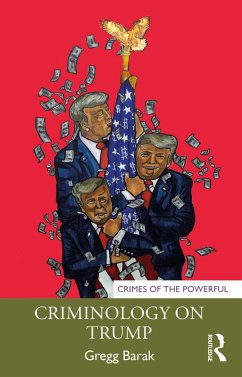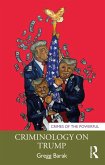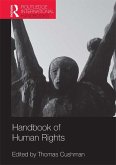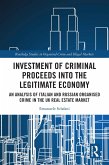Dieser Download kann aus rechtlichen Gründen nur mit Rechnungsadresse in A, B, BG, CY, CZ, D, DK, EW, E, FIN, F, GR, HR, H, IRL, I, LT, L, LR, M, NL, PL, P, R, S, SLO, SK ausgeliefert werden.
Raymond J. Michalowski, Arizona Regents Professor Emeritus, Northern Arizona University, USA
Using a broad criminological perspective that draws on issues central to white-collar and elite offending, this important book provides a deep and novel analysis of Donald Trump's behaviors before, during, and after his presidency. Barak effectively exposes the fundamental shortcomings of media-driven, and relatively narrow legal interpretations of such acts, and in doing so, issues a major rationale for crucial scholarly attention toward elite criminality while setting a copious conceptual table for future research.
Henry N. Pontell, Distinguished Professor, John Jay College of Criminal Justice and Professor Emeritus, University of California, Irvine, USA
The lifelong involvement of Donald J. Trump in a wide range of corrupt and criminal activities, continuing during his four-year presidency and in the wake of his re-election loss, is a hugely significant phenomenon in American history. Gregg Barak, in Criminology on Trump, has explored quite exhaustively this criminal career, and has applied some comparative and conceptual dimensions of criminology to advance a sophisticated understanding of it. Both students of criminology and of the present American political world have much of value to learn from this book. It can be regarded as a crowning achievement in Barak's long and distinguished career as a critical criminologist.
David O. Friedrichs, Author of Trusted Criminals: White Collar Crime in Contemporary Society, USA
Scholarly, rigorous and meticulously researched, informed by criminology, political economy and psychology, this is a hard-to-put-down, forensic and ultimately terrifying analysis of Teflon Don, whose life and times Hollywood would surely not have dared to conjure up as fiction. Barak magisterially documents Trump as the source of a devastating gamut of harms, through every crime in the book spanning the five decades before, during and after his presidency, and culminating in insurrection - failed, but for which he still evades accountability. Beware then: read this book. For as Barak convinces, in a style accessible to and demanding of the widest possible readership (this is 'newsmaking criminology' at its very best), the key forces of economic and political power which have maintained Trump to date may yet combine to propel the Racketeer-in-Chief, the only POTUS twice-impeached, back into the White House.
Steve Tombs, Professor of Criminology, The Open University, England
Award winning scholar Gregg Barak uses his critical eye to serve up a detailed and illuminating account of the decades long story of the organized deviant behaviors of Trump. In doing so he skillfully weaves together theories of personality and social structure in this fascinating and unique description of how a deviant life course emerges, and how that life course was projected as normal and even laudable in a (social) media-dominated age.
Michael J. Lynch, Professor and Director of Graduate Programs, Department of Criminology, University of South Florida, USA
Donald Trump could be an ideal film character, like those depicted by Charlie Chaplin or Federico Fellini. But as Gregg Barak suggests, he is also the ideal subject of study for criminologists, who provide subtle evaluations of the harm caused, among others, by powerful individuals and groups. Barak takes the daunting task of analyzing the conduct of an evasive ameba and his associates, who straddle buffoonery and illegality. The book manages to position 'criminal jesters' among the forces that support and attempt to exacerbate structural inequality. This is a splendid achievement by a top critical scholar.
Vincenzo Ruggiero, Professor of Sociology, Middlesex University, England
Gregg Barak's Criminology on Trump uses detailed research to demonstrate Donald Trump's modus operandi in advancing his business and political career, and how these advances were made possible by white-collar crime, abuses of power and Trump's apparent impunity. The past and present of Donald Trump are very much an American affair, and lie at the heart of American democracy. But the Trump phenomenon is of major international interest, as is this excellent book!
Isabel Schoultz, Associate Professor in Sociology of Law, Lund University, Sweden
This work is a brilliant (and not non-controversial) analysis of the career of Donald Trump as a businessman and as a politician. However, much more than that, Gregg Barak shows also like a fine mirror the US cultural, economic, political, and institutional terrain which has enabled that career to flourish. A magistral use of criminological tools and especially of uncontested knowledge on white collar and corporate crime issues make Criminology on Trump a paramount example of case-study research. Since the book combines invaluable information (down to a filigree-level) together with the nimble writing-style of the author it is a clear must (a fascinating one!) for scientists and nonscientists in and outside the USA.
Maria Laura Bohm, Chair of Criminal Law and Criminology, Ludwig-Maximilians-Universität München, Germany and Associate External Professor, Faculty of Law, University of Buenos Aires, Argentina
Barak's Criminology on Trump is an outstanding work aimed at challenging amnesia and denial regarding the crimes of the powerful. The book is a robust newsmaking criminology project in which Donald Trump appears as the main character. Throughout his life history, Barak didactically exposes how powerful people's lack of liability for their crimes is marked by whiteness, richness, and cis heteropatriarchy in an expanding political economy of structural inequality. Understanding the scenario in which public and private actors collude is mandatory to prevent those wrongdoings from perpetuating at the expense of nature and human rights in and beyond the US territory. Barak's book fulfills this task in a thought-provoking way.
Marília de Nardin Budó, Professor of Criminology, Federal University of Santa Catarina, Brazil
Criminology on Trump is a must-read for those interested in a perspective on why and how Donald Trump was able to exploit our social and political systems to rise to power. What makes this work so critical is that even though Trump may be out of office, the era of Trump and Trumpism are far from over. And that's because Trump has charted a roadmap. Gregg Barak brings a well-honed lens as a social historian and criminologist to every page.
Abdul El-Sayed, Policymaker in Residence, University of Michigan Ford School of Public Policy, USA









